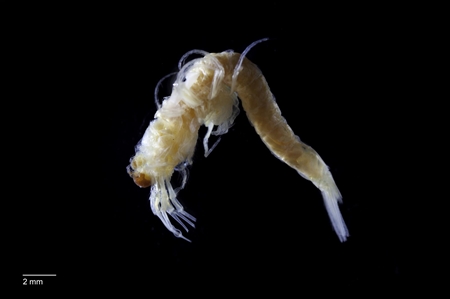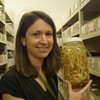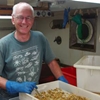General Description
Stalked eyes, carapace covering the head and most of the thorax. Rostrum small. Antennae 2 scale lateral margins with setae. Posterior margin of carapace excavate, pereonites 7, 8 exposed. Abdomen long, ending in a tail fan bearing pair of statocysts. Lateral edge of tail fan (telson) armed with spines. Up to 1 cm long.
Biology
This species remains to be described but can be identified as belonging to the genus Mysidetes. Opossum shrimps are so-called because they carry their eggs and young in a marsupium-like pouch. Mysids can form large shoals in shallow waters, thus are an abundant food source for both adult and juvenile coastal fish.
Habitat
Shallow water and seagrass beds, to depths of 37 m.
Seagrass meadows
Coastal shores
Distribution guide
Southern temperate oceans.
Species Group
Prawns, shrimps, lobsters › Mysids
Depth
Shore (0-1 m)
Shallow (1-30 m)
Deep ( > 30 m)
Water Column
Max Size
1 cm
Diet
Plankton or Particles
Commercial Species
No
Global Dispersal
Recorded in Australia
Species Code
sp. MoV 618
Conservation Status
- DSE Advisory List : Not listed
- EPBC Act 1999 : Not listed
- IUCN Red List : Not listed





